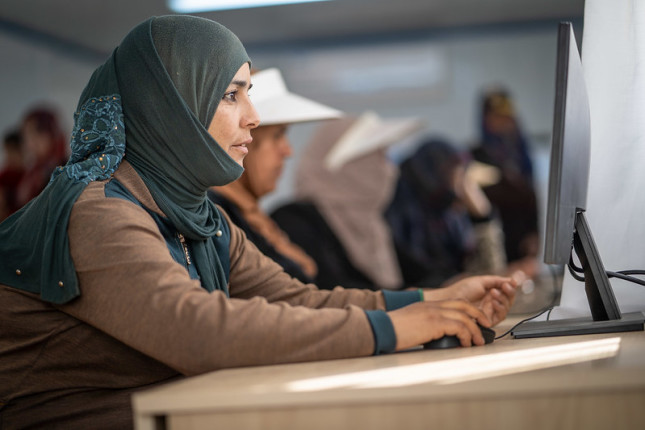-
Pushing Back the Pushback: Addressing the Complexities of Gender and Migration
March 29, 2023 By Maanasa Chitti
“We must unite our efforts to push back the pushback,” said Katrín Jakobsdóttir, Prime Minister of Iceland, at a recent side event during the 67th Session of the Commission on the Status of Women (CSW67). Humanitarian crises and forced displacement increase pushback against women’s and girl’s human rights and safety. Jakobsdóttir called for global efforts to recognize this inequity and to fight for gender equality in humanitarian responses.
Discussions centered on gender-sensitive approaches to addressing the needs of refugees, migrants, and asylum-seeking women and girls. During the event, Jakobsdóttir highlighted the concerning trend of forced displacement across the world. The number of people who were forcibly displaced last year exceeded 100 million, a significant increase from the previous decade, according to United Nations High Commission on Refugees (UNHCR) estimates. This figure has doubled during the last ten years, and coupled with the effects of the climate crisis, can be expected to rise, disproportionately affecting women. Jakobsdóttir highlighted that in Syria, women and girls comprise 70 percent of the refugee population, and in Ukraine, they account for up to 90 percent of the 8 million refugees from the past year.
Jakobsdóttir noted that the global community must acknowledge the intersection and complexity of being a migrant or refugee and being a woman during any humanitarian response. The discrimination and exploitation faced by all migrants and refugees is exacerbated by the gendered reality that makes women more vulnerable to gender-based violence, sexual violence, forced and early marriage, and sex trafficking.
In addressing the importance of accessible and safe digital solutions in humanitarian responses, Sergiy Kyslytsya, Permanent Representative of Ukraine to the United Nations, emphasized the role of digital solutions in providing innovative ways of equipping women and girls with justice and support services that may be limited otherwise. Kyslytsya highlighted the successes of SafeWomenHUB, a digital platform that has provided psychological aid to more than 2,700 women and girls in Ukraine, and Women for the Future, a project which provided online training, career development, and job-seeking consultations to more than 15,000 women who lost their employment due to displacement.
While digital technology is a powerful tool in improving access to information for migrant women, it also reinforces existing barriers to resources. “Migration laws, policies, and practices continue to reproduce or reinforce existing gender inequalities and create situations which expose migrant women to greater risks of discrimination and human rights violations at all stages of the migration process,” said Jemimah Njuki, Chief of Economic Empowerment at UN Women. A “digital gender gap” exists, and it is even worse for migrant women who often lack access to online connectivity, digital services, and the skills that utilizing these services demands, she added.
Additionally, the rapid digitalization and development of technology in the wake of the pandemic has been met with a shift of criminal activity online, said Pär Liljert, Director of the International Organization for Migration Office to the United Nations in New York. Because migrants and refugees are known to rely primarily on the information received from their peers via social networks rather than official sources, they are extremely vulnerable to trafficking and abuse through recruitment on digital platforms. To address this, Liljert emphasized the importance of strengthening gender-sensitive approaches and targeting digital awareness-raising campaigns, online safety, and self-protection education to address the infiltration of crime into cyberspaces.
“The CSW is the most important gathering dedicated to the promotion of women’s rights and gender equality in the world,” said Njuki. “I really urge us to focus our attention to the needs of the more than 140 million migrant women around the world and advance gender-responsive laws and policies and services, which not only promote their empowerment, but ensures that they can fully enjoy their rights in countries of origin, countries of transition, and countries of destination through the whole migration process.”
Read More:
- The pandemic exacerbated violence against refugee women and girls
- The mental health impacts of the Russian invasion on Ukrainians
- The ongoing impacts of the Russian invasion on Ukraine one year later
Sources: Commission on the Status of Women, HealthRight International, United Nations, United Nations High Commission on Refugees, Women for the Future.
Photo Credit: Empowerment through employment for Syrian refugee women in Jordan. UN Women/Flickr.com.
 A Publication of the Stimson Center.
A Publication of the Stimson Center.



